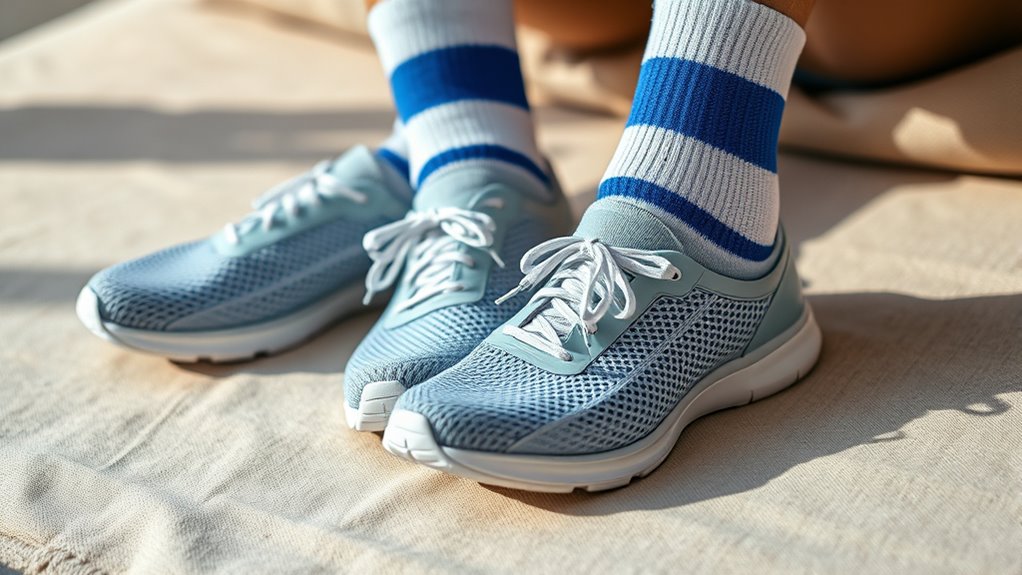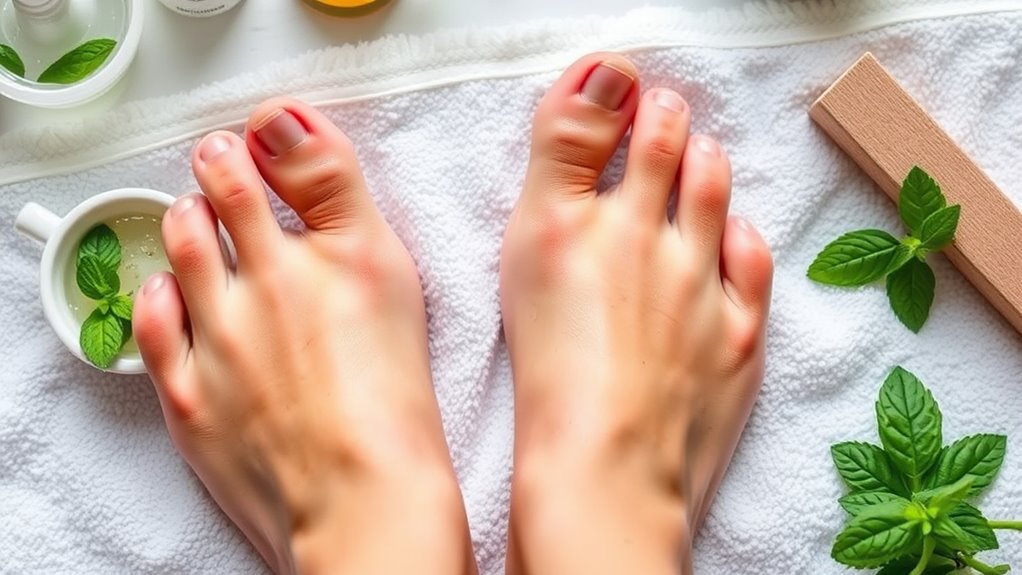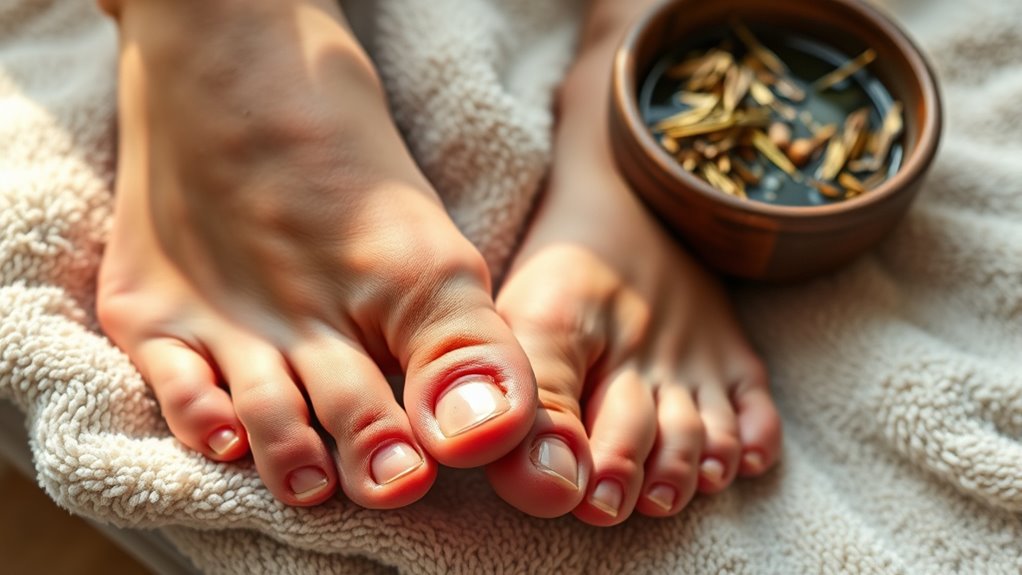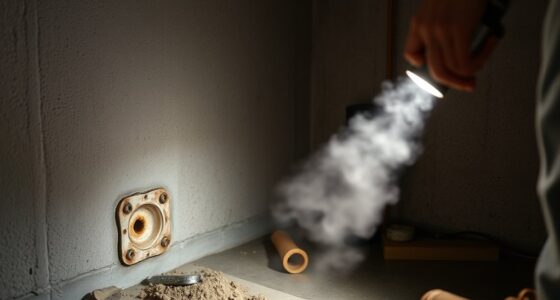To banish smelly feet, focus on good hygiene by washing daily, thoroughly drying, and changing socks regularly. Use antibacterial or deodorizing products containing tea tree oil or zinc, and apply them properly to areas prone to odor. Wear breathable shoes made of natural materials and soak your feet in natural remedies like apple cider vinegar or tea tree oil for extra freshness. Keep your feet dry and consider new tips that can help keep odor at bay if you keep exploring.
Key Takeaways
- Maintain daily foot hygiene by washing with soap, thoroughly drying, and changing socks regularly.
- Use antibacterial and deodorizing foot products containing tea tree oil, eucalyptus, or zinc oxide.
- Wear breathable shoes made of natural materials and moisture-wicking socks, rotating footwear daily.
- Soak feet in natural remedies like apple cider vinegar, tea tree oil, or Epsom salt to reduce bacteria and odor.
- Apply foot powders or sprays evenly on clean, dry skin to control moisture and odor throughout the day.
Maintain Proper Foot Hygiene

Maintaining proper foot hygiene is essential for preventing smelly feet. You should wash your feet daily with soap and warm water, paying attention to areas between the toes. Dry your feet thoroughly afterward, as moisture encourages bacteria growth that causes odor. Change your socks regularly, especially if they become damp or sweaty. Choose breathable footwear made of natural materials like leather or cotton, which allow airflow and reduce moisture buildup. Avoid wearing the same pair of shoes every day; give them time to air out. Keep your toenails trimmed and clean to prevent dirt and bacteria from accumulating. Additionally, opting for water-resistant shoes can help keep your feet dry in damp conditions. By staying consistent with these habits, you considerably reduce the bacteria and fungi responsible for foot odor, keeping your feet fresh and healthy.
Use Antibacterial and Deodorizing Foot Products

Choosing the right antibacterial and deodorizing foot products is key to controlling odor. Make sure you apply them correctly for maximum effectiveness, focusing on clean, dry skin. Consistent use alongside good foot hygiene will give you the best results. Additionally, selecting products that promote foot health can help prevent issues like fungal infections and skin irritation.
Choose Effective Products
To effectively combat smelly feet, selecting the right antibacterial and deodorizing foot products is essential. Look for formulas with active ingredients like tea tree oil, eucalyptus, or zinc oxide—they target germs and neutralize odors. Choose products suited for your needs, whether sprays, powders, or wipes, and ensure they’re designed for foot use. Picking effective products makes a real difference in controlling odor and preventing bacteria buildup. Incorporating real couples’ experiences can also provide helpful insights into managing foot hygiene in everyday life.
Proper Application Techniques
Applying antibacterial and deodorizing foot products correctly guarantees maximum effectiveness in controlling odor and bacteria. First, make sure your feet are clean and dry before application. Shake the product well if needed, then spray or apply a small amount directly onto your feet, focusing on areas prone to sweating and odor, such as between the toes and the soles. Use your fingers or an applicator to spread the product evenly, ensuring full coverage. Allow the product to dry completely before putting on socks or shoes to prevent dilution and transfer. Avoid over-application, which can cause irritation or buildup. Consistent, proper application helps maintain freshness and keeps bacteria at bay, making your efforts more effective in managing smelly feet. Incorporating exfoliation techniques can further improve skin texture and reduce odor-causing bacteria.
Consistent Foot Hygiene
Maintaining consistent foot hygiene is essential for effectively controlling odor and bacteria buildup. You should wash your feet daily with antibacterial soap, focusing on areas between your toes. After washing, thoroughly dry your feet, especially between the toes, to prevent dampness that fosters bacteria. Incorporate the use of antibacterial and deodorizing foot products, such as sprays or powders, to keep odor at bay throughout the day. Applying these products regularly helps reduce bacteria and neutralize smells before they become noticeable. Wearing clean socks made of breathable materials also supports your hygiene routine. Consistency is key—sticking to this routine daily ensures your feet stay fresh, odor-free, and healthy, preventing smelly feet from taking hold. Studies show that best foot hygiene practices can significantly improve foot odor control.
Choose Breathable Footwear and Socks

Choosing breathable footwear and socks is essential to prevent sweaty feet from becoming a breeding ground for odor-causing bacteria. When your shoes and socks allow air circulation, moisture evaporates, reducing bacteria growth and odor. Opt for shoes made of natural materials like leather or mesh, which promote airflow. Select socks made from moisture-wicking fabrics such as cotton or wool to keep your feet dry. Avoid synthetic materials that trap heat and sweat. Regularly rotate your shoes, giving them time to dry out completely. Keep your feet dry by changing socks if they become damp during the day. Proper footwear choices make a significant difference in controlling foot odor and maintaining fresh feet daily. Ensuring your footwear is properly cleaned and dry also helps prevent bacterial buildup that causes odor.
Soak Feet in Natural Remedies

Have you considered soaking your feet in natural remedies to combat odor? Soaking is an easy, effective way to reduce bacteria and neutralize smells. You can try a simple foot soak with apple cider vinegar, which has antibacterial properties. Mix one part vinegar with two parts water and soak your feet for 15-20 minutes. Alternatively, tea tree oil, known for its antimicrobial benefits, can be added to warm water—just a few drops will do. Epsom salt soaks also help by drawing out toxins and reducing bacteria. For a soothing option, pour warm water with a handful of dried sage or rosemary, both of which have natural deodorizing qualities. Regular soaks can help keep your feet fresh and odor-free naturally. Incorporating AI-driven health solutions can further personalize your foot care routine and enhance effectiveness.
Manage Sweat and Moisture Levels

Controlling sweat and moisture is key to preventing foot odor, as damp environments promote bacterial growth. When your feet stay wet, bacteria thrive, causing that unpleasant smell. To manage moisture effectively, consider these tips:
- Wear breathable shoes made of materials like leather or mesh to let air circulate.
- Choose moisture-wicking socks that pull sweat away from your skin.
- Change socks daily, especially if your feet tend to sweat heavily.
- Use foot powders or antiperspirants designed for feet to reduce sweating and absorb excess moisture.
- Educating yourself about foot health can help you adopt better practices to keep your feet dry and odor-free.
Adopt Daily Foot Care Habits

Establishing a consistent daily foot care routine is vital for preventing odor and maintaining healthy feet. You should wash your feet daily with soap and warm water, paying attention to areas between your toes. Afterward, dry them thoroughly to prevent moisture buildup. Applying antifungal powder or spray can help keep feet dry and odor-free. Wearing clean, breathable socks daily is essential, and swapping them out if they become damp. Regularly inspecting your feet for signs of infection or irritation ensures early treatment. Remember, small daily habits make a big difference in odor control and foot health. Additionally, understanding the scientific skepticism surrounding certain remedies can guide you toward more effective solutions.
Frequently Asked Questions
Can Diet Affect Foot Odor?
Your diet can definitely influence foot odor. When you eat spicy foods, processed snacks, or sugary treats, your body produces more sweat, which can lead to stronger odors. Consuming lots of garlic, onions, or alcohol can also contribute to bad smells. To help, you should eat a balanced diet rich in fruits, vegetables, and water. This helps reduce odor-causing bacteria and keeps your feet smelling fresh.
Are There Natural Home Remedies for Persistent Foot Smell?
Persistent foot smell can be pesky, but plenty of natural, nifty remedies exist. You can soak your feet in a solution of vinegar and water to neutralize odors, or sprinkle talcum powder to tame dampness. Additionally, tea tree oil offers antiseptic power, and baking soda can absorb unpleasant smells. Maintaining meticulous hygiene, changing socks regularly, and airing out shoes can also help keep your feet fresh and odor-free naturally.
How Long Does It Take to Notice Improvements?
You might notice improvements in your foot odor within a few days of using effective remedies, but it can take up to two weeks for significant results. Consistency is key; keep up with daily foot washing, drying, and using treatments like soaking or powders. If you stick with these habits, you’ll likely see your foot smell diminish gradually, making your feet feel fresher and more comfortable over time.
Are Certain Foot Conditions More Prone to Odor?
Like a garden that’s prone to weeds, certain foot conditions are more likely to develop odor. Conditions such as athlete’s foot, fungal infections, or excessive sweating create an environment where bacteria thrive, fueling unpleasant smells. You need to pay close attention to these signs and treat them early. By understanding which issues are more prone to odor, you can take targeted steps to keep your feet fresh and healthy, avoiding persistent smells.
When Should I See a Doctor for Smelly Feet?
If your smelly feet persist despite trying home remedies, it’s time to see a doctor. You should also visit if you notice symptoms like persistent itching, redness, swelling, or sores that won’t heal. These could indicate infections or other underlying conditions needing professional treatment. Don’t ignore ongoing discomfort or odor, especially if it worsens. A healthcare provider can diagnose any issues and recommend appropriate treatments to keep your feet healthy.
Conclusion
Now that you know these effective solutions, aren’t you ready to say goodbye to smelly feet for good? With proper hygiene, breathable shoes, and natural remedies, you can regain confidence and comfort. Why let stubborn odor hold you back from feeling your best? Take charge today, and step confidently into each new day, knowing you’ve got the tools to keep your feet fresh and odor-free. The choice is yours—are you ready to make that change?









